|
|
|
Sort Order |
|
|
|
Items / Page
|
|
|
|
|
|
|
| Srl | Item |
| 1 |
ID:
180641
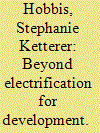

|
|
|
|
|
| Summary/Abstract |
Based on an in-depth examination of the acquisition, use, maintenance and deterioration of solar home systems in a village in Malaita, Solomon Islands, this article challenges the analytical focus of current debates on electrification in Pacific Island countries – why Pacific Island countries have not yet sufficiently electrified to achieve their development goals. Alternatively it examines what is, how, in this case, rural Solomon Islanders have integrated already available electricity into their daily lives. This perspectival shift highlights how rural Solomon Islanders have developed an energy identity that corresponds to their needs, interests and values, rather than those of national and international actors. It re-emphasises the struggles of national and international electrification initiatives in rural environments, linking them to a broader distrust in the motivations of external actors. At the same time, it reveals how, throughout their life cycle, rural solar home systems have become integrated into processes of social reproduction rather than development aspirations. Contrary to dominant debates, rural solar home systems matter most in the opportunities that they provide for reciprocal exchange than for what the electricity enables them to do.
|
|
|
|
|
|
|
|
|
|
|
|
|
|
|
|
| 2 |
ID:
180644
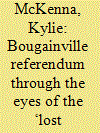

|
|
|
|
|
| Summary/Abstract |
A referendum to decide on Bougainville's future political relationship with Papua New Guinea was held in November 2019. The deferred, non-binding, referendum is a key milestone contained in the Bougainville Peace Agreement (BPA), which sought to reconcile a violent conflict from 1988 to 1998. Although the Bougainville peace process has been deemed a success and significant milestones have been reached towards implementation of the BPA, the conflict continues to have enduring impacts. Particular concerns have been raised about Bougainville's large youth population, often referred to as the ‘lost generation’. This paper documents observations of the 2019 referendum from the perspective of four university students born during the conflict in Siwai District, South Bougainville, whom participated officially in the referendum as an observer group. While trauma and a disrupted education have contributed to youth unemployment and substance abuse in Bougainville, the paper offers a stark contrast to negative narratives of young Bougainvilleans as lacking capabilities to contribute to social and political life. As Bougainville embarks on yet another period of political uncertainty, the paper calls for greater attention to finding avenues to support these young voices to ensure that their generation is not ‘lost’ forever.
|
|
|
|
|
|
|
|
|
|
|
|
|
|
|
|
| 3 |
ID:
180647
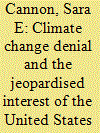

|
|
|
|
|
| Summary/Abstract |
The Compacts of Free Association (COFA) are agreements between the United States of America and three Pacific Island countries: the Republic of the Marshall Islands (RMI), the Federated States of Micronesia (FSM) and Palau, collectively the Freely Associated States (FAS). COFA provides the FAS financial assistance to build their economies and foster financial independence; in exchange, the United States has regional military control. The United States is the world's second largest emitter of greenhouse gases, while the FAS produce few emissions but are vulnerable to climate impacts. I highlight inconsistencies in U.S. policies from within its own paradigm by ‘seeing like an empire’ to show how contradicting priorities jeopardise American interests in the region. Aid provided by COFA has done little to build infrastructure supporting the FAS's economically independence, and climate change diverts economic resources to funding climate adaptation. The United States is currently battling China to maintain hegemony in the Pacific, making the FAS strategically important for national security. Meanwhile, climate change threatens U.S. military installations in the FAS. It is in the United States' best interests to limit emissions to protect its investments in the FAS, but this requires a policy change to prioritise its commitments in Micronesia over climate change denial.
|
|
|
|
|
|
|
|
|
|
|
|
|
|
|
|
| 4 |
ID:
180640


|
|
|
|
|
| Summary/Abstract |
Climate change is a leading threat to sustainable socio-economic development in Bangladesh. Adverse impacts of climatic disasters including flash floods, recurrent cyclones and erratic rainfall patterns are already causing hardship for both rural and urban people and are expected to accelerate into the future. The aim of this research note is to identify the core contributing economic sectors to climate change in Bangladesh, and to consider effective mitigation strategies. Following the 5th Assessment Report (AR5) of the Intergovernmental Panel on Climate Change (IPCC) report (2014), in this paper, we argue that comprehensive mitigation measures are required in the energy, transport, buildings, industry and land-use sectors to reduce Greenhouse Gas (GHG) emissions. Our findings indicate that it is crucial that government and non-government mitigation efforts engage with community knowledge practices in order to most effectively reduce GHG emissions and combat the adverse impacts of climate change.
|
|
|
|
|
|
|
|
|
|
|
|
|
|
|
|
| 5 |
ID:
180642


|
|
|
|
|
| Summary/Abstract |
Global discussion of payment for ecosystem services (PES) has moved beyond the simple notion of effecting environmental and livelihood improvement for participants. Changes in the local governance following the introduction of PES have become a focus as it may affect the local incentive for sustainable natural resource management. Although there has been increasing attention on the interplay between different institutions in shaping PES outcomes, the institutional outcomes resulting from these interactions and the understandings of local institutional dynamics are limited. Drawing on in-depth case studies from Southwest China, this research uses an institutional bricolage framework to examine how pre-existing and informal local institutions interacted with a newly introduced and formal PES programme – the Chinese Sloping Land Conversion Programme. It reveals that institutional bricolage processes can lead to positive ecological and socioeconomic outcomes when hybrid institutions were built to fit the local socio-ecological contexts. The policy implication from this research calls for decentralisation reforms and provision of institutional flexibility. This would allow bricolage processes to foster adaptive governance in the implementation of PES programmes.
|
|
|
|
|
|
|
|
|
|
|
|
|
|
|
|
| 6 |
ID:
180646


|
|
|
|
|
| Summary/Abstract |
Oceania includes sovereign states as well as overseas territories of metropolitan powers. In both cases, contemporary geopolitical borders are legacies of colonialism. As in many (de)colonised places, materialisations of spatially anchored social imaginaries and practices of self and otherness, play a role in the everyday politics of Oceania's communities and states. Notably, cultural intimacies (Herzfeld, 2016) in this region are also shaped by tensions between islands in an archipelagic unit. Characterised by plural identities, Oceania's communities must navigate solidarities within the colonial borders of unitary sovereign states or non-sovereign island territories. Given this context, we ask whether spatially anchored identities within archipelagic contexts are politically engaged, playing a role in the politics of state (dis)cohesion across the region. This paper presents findings from 73 interviews across four pairs of Pacific islands – Wallis-Futuna, Tahiti-Mangareva, Rarotonga-Manihiki, Pohnpei-Chuuk – exploring how communities define their own identities and the identity of those on ‘the other island’. We find both sides in agreement on six complementary and rather respectful identities. We therefore suggest that while political tensions and calls for secession in archipelagos are real, it is unlikely that identity politics at this point in time inflames political break ups.
|
|
|
|
|
|
|
|
|
|
|
|
|
|
|
|
| 7 |
ID:
180643
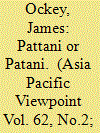

|
|
|
|
|
| Summary/Abstract |
The conflict in Southern Thailand has claimed over 7000 lives in the last 15 years, with no end it sight. The Thai state has consistently misinterpreted both the causes and the solutions to the problems. This article seeks to identify one cause for the conflict, through examining identity in the south through the lenses of collective memory and forgetting. By focusing on young activists at university, it demonstrates the ways that collective memory is generated through shared pilgrimages to sacred places, and shared activities in the pursuit of peace. It also explores the ways that shared memory is both created through debate, through sharing and even through hate speech on the internet, and discusses the ways that social media debates deepen collective memory in oppositional and dangerous ways. Finally, the article argues that until a place is found for local collective memories of Patani in the Thai national collective memory, long-term peace will be impossible.
|
|
|
|
|
|
|
|
|
|
|
|
|
|
|
|
| 8 |
ID:
180639
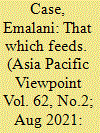

|
|
|
|
|
| Summary/Abstract |
Sponsored by the Asia Pacific Viewpoint, this paper was originally delivered as a keynote address at the New Zealand Geographical Society (NZGS) conference in November of 2020. Building on the conference theme, ‘Embracing Diversity: Expanding Geographies’, it argues that any consideration of our diverse, layered and growing environments must consider the sacred. Rather than focus solely on what are often deemed ‘sacred’ sites – or those places marked by physical signposts, particular rituals or sanctioning – it encourages us to think deeply about the everyday sacred though recognising how places feed. Flowing between places and times, between Kumutoto Stream in Te Whanganui-a-Tara and Pōhakuloa in Hawaiʻi, this paper is a call to stand on whenua and see it, smell it, taste it and love it. It is an invitation to relate to place on an intimate level. It is a prompting to be critical of the urban and colonially constructed spaces that have become naturalised in our daily lives and to uncover the stories, histories and peoples they work to displace and erase so that we can plant collective roots of resistance and solidarity for better futures.
|
|
|
|
|
|
|
|
|
|
|
|
|
|
|
|
| 9 |
ID:
180645
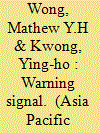

|
|
|
|
|
| Summary/Abstract |
This article examines the discourse of ‘Li's Field’ in Hong Kong, named after tycoon Li Ka-shing and used to satirically denounce the government-business political nexus. The discourse challenges the apparent reluctance of the weather agency to decide that a typhoon is strong enough to warrant a city-wide suspension of business activities, which would obviously be detrimental to capitalist interests. In comparison to the earlier period characterised by political trust, institutional and political factors in recent decades have intensified the impression of government-business collusion and the erosion of political trust. Li's Field is a case illustrating how political distrust can spill over into bureaucracy, challenging the traditions of bureaucratic neutrality and meritocratic and scientific policymaking. This article provides an analysis of the ‘field’ with primary interview data, media discourse analysis and secondary data. This study contributes by exploring political trust in politicians and bureaucrats, and how the former spills over into the latter.
|
|
|
|
|
|
|
|
|
|
|
|
|
|
|
|
|
|
|
|
|